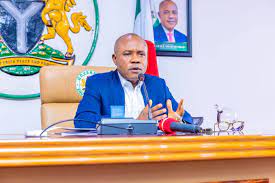The federal government Tuesday said it will begin the second rollout of Digital Switch Over (DSO) from Thursday April 29, 2021 in Lagos state.
Minister of Information Lai Mohammed made the disclosure during an interactive session between the Senate Committee on Information and National Orientation and the 13-member ministerial task force on the DSO project.
“We are kick-starting the new roll out in Lagos state on April 29, while Kano on June 3, and Rivers on July 8. We will then follow up with Yobe s on July 15 and Gombe on Aug 12. To date, we have rolled out the DSO in five states and Abuja,” the minister said.
Mohammed further told the committee the DSO had gone live in the Federal Capital Territory, Kwara, Kaduna Enugu and Osun states.
The minister also said the ministry considered the DSO as “one of its priority projects, given its potential to create jobs, bring governance closer to the people through better access to information, provide quality programming to Nigeria’s estimated 24 million television households, with high fidelity pictures and sound.”
“Without mincing words, let me say straight away that for us, the DSO is about stimulating local content and empowering platform owners”, he said.
Mohammed said “the manufacturing of Set Top Boxes or decoders alone is capable of creating 50,000 jobs, while television production could create 200,000 jobs.
“Film Production can generate 350 to 400,000 jobs, distribution, which entails supplying the market with Set Top Boxes, TVs and Dongles for the internet; will require at least 100,000 wholesalers. Advertising can create a further 50,000 jobs.”
He said the ministry had “taken some steps to create the enabling environment for the DSO to succeed, for local content to thrive, for indigenous producers to be more engaged and for the local advertising market to grow.”
Mohammed also told the lawmakers that the federal government had carried out an unprecedented reform of the broadcasting industry, given the nexus between the reforms and success of the DSO.
On amendments made, he said they were necessitated by the need to boost the local content in Nigeria, curb anti-competitive and monopolistic tendencies and boost advertising revenues.
“We have amended the code to curb monopoly and exclusivity of programme content in order to create room for the local industry to grow. For example, the pay TV sector of the broadcast Industry had been controlled by foreign interests, while indigenous efforts to compete have been frustrated or weakened by the established control of the big monopolies.
“It will interest you to know that to date, the National Broadcasting Commission (NBC) has licensed over 30 Nigerian pay TV companies, but only 1 is currently struggling to break through, this is not acceptable.
“The monopolies exclude many Nigerians from enjoying or having access to premium content, especially in the area of sports and movies. With the amendment to the code, anyone owning any sports rights must make such available to other parties in Nigeria, who may be interested in acquiring these rights,” the minister further said.




